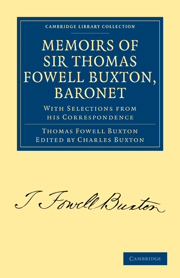Book contents
- Frontmatter
- PREFACE
- Contents
- CHAPTER I 1786–1802
- CHAPTER II 1802–1807
- CHAPTER III 1807–1812
- CHAPTER IV 1812–1816
- CHAPTER V 1816–1817
- CHAPTER VI 1818, 1819
- CHAPTER VII 1820, 1821
- CHAPTER VIII 1821–1823
- CHAPTER IX 1823–1826
- CHAPTER X 1822–1826
- CHAPTER XI 1826, 1827
- CHAPTER XII 1827, 1828
- CHAPTER XIII 1828, 1829
- CHAPTER XIV 1829
- CHAPTER XV 1829, 1830
- CHAPTER XVI 1830
- CHAPTER XVII 1831
- CHAPTER XVIII 1832
- CHAPTER XIX 1833
- CHAPTER XX 1833
- CHAPTER XXI 1833, 1834
- CHAPTER XXII 1834, 1835
- CHAPTER XXIII 1835, 1836
- CHAPTER XXIV 1836
- CHAPTER XXV 1837, 1838
- CHAPTER XXVI 1838
- CHAPTER XXVII 1838, 1839
- CHAPTER XXVIII 1839, 1840
- CHAPTER XXIX 1840
- CHAPTER XXX JUNE, 1840, TO APRIL, 1841
- CHAPTER XXXI 1841
- CHAPTER XXXII 1843, 1844
- CHAPTER XXXIII 1843, 1844, 1845
- RECOLLECTIONS OF SIR T. FOWELL BUXTON
- APPENDIX TO CHAP. XVII
CHAPTER XXV - 1837, 1838
Published online by Cambridge University Press: 05 July 2011
- Frontmatter
- PREFACE
- Contents
- CHAPTER I 1786–1802
- CHAPTER II 1802–1807
- CHAPTER III 1807–1812
- CHAPTER IV 1812–1816
- CHAPTER V 1816–1817
- CHAPTER VI 1818, 1819
- CHAPTER VII 1820, 1821
- CHAPTER VIII 1821–1823
- CHAPTER IX 1823–1826
- CHAPTER X 1822–1826
- CHAPTER XI 1826, 1827
- CHAPTER XII 1827, 1828
- CHAPTER XIII 1828, 1829
- CHAPTER XIV 1829
- CHAPTER XV 1829, 1830
- CHAPTER XVI 1830
- CHAPTER XVII 1831
- CHAPTER XVIII 1832
- CHAPTER XIX 1833
- CHAPTER XX 1833
- CHAPTER XXI 1833, 1834
- CHAPTER XXII 1834, 1835
- CHAPTER XXIII 1835, 1836
- CHAPTER XXIV 1836
- CHAPTER XXV 1837, 1838
- CHAPTER XXVI 1838
- CHAPTER XXVII 1838, 1839
- CHAPTER XXVIII 1839, 1840
- CHAPTER XXIX 1840
- CHAPTER XXX JUNE, 1840, TO APRIL, 1841
- CHAPTER XXXI 1841
- CHAPTER XXXII 1843, 1844
- CHAPTER XXXIII 1843, 1844, 1845
- RECOLLECTIONS OF SIR T. FOWELL BUXTON
- APPENDIX TO CHAP. XVII
Summary
With the session of 1836, had closed the sitting of the Aborigines' Committee, and the drawing up of its report was entrusted to Mr. Buxton as its chairman. He was anxious to render this report a sort of manual for the future treatment of aboriginal nations, in connection with our colonies. Accordingly, in January, 1837, he invited Dr. Philip to Northrepps, and commenced his work.
“Dr. Philip has been here three days,” he writes. “We are in the heart of the Report on Aborigines. Oh! for a spirit of wisdom poured clown on our labours.”
The object of the report was to prove, first, the destructive cruelty to which the native tribes had generally been subjected: and, secondly, that wherever they had received equitable and humane treatment, they had increased in numbers, acquired the arts of civilized life, and accepted the blessings of religion.
“April 2. 1837.
“The next few months are very important, as in them the Aborigines' Report will be settled. Most earnestly I pray that it may stop the oppressor, and open the door for the admission of multitudes of heathens to the fold of Christ.
“Then there is the Apprenticeship Committee, which I bring forward on the 20th; and the Slave Trade Question, and East Indian slavery; and other deep and various interests which will speedily be unfolded. […] ”
- Type
- Chapter
- Information
- Memoirs of Sir Thomas Fowell Buxton, BaronetWith Selections from his Correspondence, pp. 415 - 428Publisher: Cambridge University PressPrint publication year: 2010First published in: 1848



